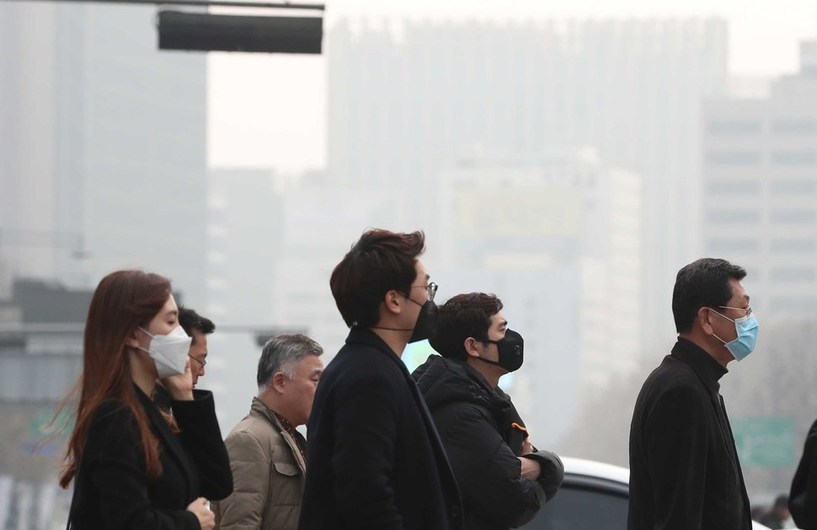 |
|
Seoulites wear anti-pollution masks on Mar. 6, when levels of fine particulate matter throughout the city were extremely high. (Park Jong-shik, staff photographer)
|
As a superpower, China unlikely to sign any anti-pollution treaty with legal force
As reports are filed blaming China for the choking levels of fine particulate matter that have been blanketing South Korea in recent months, there are increasing calls for the government to come up with meaningful diplomatic measures that can encourage the Chinese government to reduce its levels of fine dust. On Mar. 6, the Seoul Institute of Public Health and the Environment released a report stating that the recent increase of particulate matter levels in Seoul was the result of poor domestic weather conditions interacting with the influx of fine particulate matter (with a diameter of less than 2.5 micrometers, or PM2.5) from Beijing and Shenyang, China. For this reason, experts argue, resolving the issue of fine dust in Korea fundamentally requires reducing the amount of fine dust produced in China. “Reducing the density of fine dust in Beijing won’t have much of an effect on Korea. The important thing is the total output on the Chinese mainland,” said Cho Seok-yeon, a professor of environmental engineering at Inha University. “We should take note of Europe’s success at tackling air pollution, which was causing severe acid rain in the 1960s. Through the 1979 Convention on Long-Range Transboundary Air Pollution (CLRTAP) and the 1985 Helsinki Protocol, Europe was able to reduce sulfur emissions, which were the major culprit behind acid rain, by 30%,” Cho said. Potential of utilizing S. Korea-China FTA to reduce emissions Others say that Korea should make use of its free trade agreement (FTA) with China. Song Gi-ho, a lawyer and an expert in commerce, says that Korea should renegotiate the FTA with China that’s currently in effect and force China to take responsibility for managing its emissions of particulate matter. “Looking at the Korea-US Free Trade Agreement, the two countries took the institutional step of setting up an environmental council that made it procedurally possible for interested parties to request investigations of violations of environmental laws by the other country. Since China’s emissions of fine dust may well be in violation of its own environmental regulations, a provision should be added to the FTA to enable South Korea to ask the Chinese government to review and investigate violations of its own environmental laws by Chinese companies,” Song said. But some think that such an FTA-centered approach is unrealistic since South Korea would be forced to tackle the issue through its bilateral relationship with China without any help from its neighbors. In one-to-one diplomatic relations with China, South Korean negotiators are at a disadvantage. Voluntary convention with other Asian countries to pressure China For this reason, Ji Hyeon-yeong, the director of the Fine Dust Center at the Korea Green Foundation, proposes a more practical option. “If we’re talking about effectiveness, an achievable model would be creating a voluntary reduction convention with other Asian countries that are directly or indirectly affected by Chinese particulate matter, which would leave China, as the leading country of Asia, with no choice but to implement that reduction. A monitoring system among equals can work in Europe, where countries are of a similar size and development level, but in Asia, superpowers like China and India are likely to avoid signing a treaty that has legal force.” Such considerations can also be seen as having motivated the Northeast Asia Clean Air Partnership (NEACAP), which the South Korean government signed with China, Japan, Mongolia, Russia and North Korea in Oct. 2018. “Even if China were placed under the obligation to reduce emissions, there’s no practical way to force it to abide by that obligation. We need to be thinking about moving toward a multilateral voluntary consultative body under which China can voluntarily set and meet mandatory reduction goals in the manner of the National Determined Contributions (NDC) in the Paris Agreement,” explained Kwon Se-jung, head of the climate bureau at South Korea’s Ministry of Foreign Affairs. By Seon Dam-eun, staff reporter Please direct comments or questions to [english@hani.co.kr]






